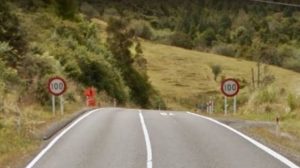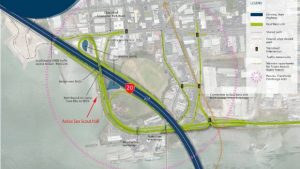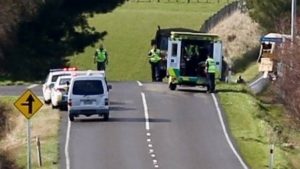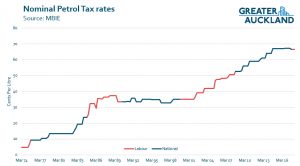Taxes and Tolls and Trains! Oh My!
The government’s Policy Statement on Land Transport is now open for public input. Talk Wellington observes the responses – including some doomsaying, fear and trembling. Should we care, and if so should we all be crying “Hooray!” or “Help!”?
A New Government Policy Statement on Transport
It’s out!
If you want to read it, there’s plenty of PDFs here. That not be your idea of a fun three hours, so, simply…
Q: What does that mean for my life?
A: It’s a big deal.
It basically sets out how money will be spent on land transport. Very crudely (there’s a much better explanation here): the central government set it for the tax money that goes on transport, but councils also have to make rates spending consistent (and lots of what councils get to spend comes from tax money they get from the government).
So if you ever hear “Why does NZ spend so much on xxx?” or “Why do we invest so little in yyy?” the answer is probably “The GPS on Transport”.
Greater Auckland have done an excellent post – really worth a read. Our quick take on the new GPS is below.
What’s new?
Our quick highlights:
- State highway funding stays at the previous (record high) levels but is spread around making the nation’s most dangerous highways safer rather than building a few new big-ticket (and some really dubious) projects. Fewer fancy new roads, fewer people dying on the roads we have.
- Much more balanced in terms of ways people and goods get around, like:
- Funding for more and better public transport including for mass transit (i.e. urban heavy and light rail, high-capacity buses etc),
- Funding making it easier and better to travel by “active modes” (wonk speak for walking, cycling, scooting),
- Funding for more and better rail to play its role in freight movement
- Transport’s overwhelming influence on important outcomes – like greenhouse gas emissions, and people’s everyday behaviour and our public health – are now actually mentioned in the GPS.
What’s really interesting is that this is where the government starts walking its talk. The Ardern administration has had some very encouraging rhetoric, but to paraphrase Joe Biden (hat tip to Greater Auckland):
“Don’t tell me what you value. Show me your budget and that’ll tell me what you value.”
And – superbly – the new government’s rhetoric about transport investments that improve NZers’ health and lives is actually backed up by funding – that’s really good to see.
Significant change will be needed inside NZTA and councils, as they’re not used to giving or getting funding for the most basic transport modes – walking, and human-powered transport like cycling. (This is the first time there’s tax “transport” money for footpaths).
“Oh my!” … but really?
Lobby groups are doing what they do: leaping in and releasing predictable press statements about it. “Hooray, at last!” say some. “Aargh it’s the end!” say others.
Organisations expert in how people use towns are really pleased. Walking and accessibility/disability advocates – like Living Streets Aotearoa – are strongly welcoming it.
Organisations whose DNA is big diesel vehicles making smooth fast journeys – like trucking industry advocates the Road Transport Forum – are very disappointed (and claiming new politicisation of the funding).
It’s worth noting that there are several changes that’ve been happening anyway under the previous administration, but the media are now focusing on – and some folk are bundling together as “all the new government’s stuff”. Dedicated cycling infrastructure now appearing on the ground, more scope to slow road speeds, and tolling for big expensive new roads are all changes that make many people cross (usually in the Stuff comments, but especially for cycling) – but they were all happening anyway. We can’t blame or thank this government for them – the last government can take credit (or blame, if you disagree with us and don’t like them!)
So on this new GPS on Transport, whose voices should you trust? Is the rebalanced GPS good news or bad for us all, or same same but different?
Basically it depends whether you think non-motorway travel, and ways of moving other than the private car, have been over-prioritised in our funding, or not. Which depends on what you think a better NZ looks like.
Does a better NZ continue to cater mostly for people driving private cars and goods moving overwhelmingly by truck, or have things and people getting around in more diverse ways? Does it have better emissions and public health?
At Talk Wellington we believe a rebalancing is badly overdue. So we’re really happy to see those changes mentioned above.

We’ve started slowing down this stuff already, thank goodness
OK but what’s the cost?
Some of the GPS‘s changes are “reprioritisation” (like moving money to spending on existing roads rather than building big new ones). Some of it will cost a bit more – it’s coming from a variety of sources. One of the ways we’ll pay for all the goodness is fuel and excise tax increases: across the country they’ll rise 3-4 cents per litre for each of the next three years, and there’s a proposed Regional Fuel Tax in Auckland to pay for their public transport improvements.

Some commentators are making much of the cost, and it’s a great way to get quick resistant voxpops from Auckland people (because no-one will say ‘Hell yeah I want more tax”.)
There’s a lot of puffery on both sides about whether these costs would’ve been necessary anyway, and it’s just being put to different things, and whether it’s a “new tax” where it’s just another increase on an existing one.
Here’s the petrol tax increase in context (right).
Taxes also have a lot of disadvantages as a tool to shape behaviour and get good outcomes – including that they hit the poor hardest.
Hopefully the government will do what sensible governments do and institute a whole suite of measures to ensure those who’re already disadvantaged by the car-centric design of our cities aren’t hit hardest.
And hopefully the investments will actually get more people taking public transport – by making it better and cheaper.
So all up, this New GPS – Hooray or Hell no?
Yes there’s a lot of “aargh!” talk – especially from people who command lots of attention, like radio and morning TV commentators.
There’s a lot of myth pushing, and silly pedantry, going on right now, including from the government. Check out “Ten pieces of nonsense they’re talking about transport” to make sure you don’t get sucked into the silliness.
What’s our take?
It’s a much more balanced spend of our transport dollar. It’s rebalancing towards really efficient and good-for-us transport modes so the car, along with all the other modes, can play an appropriate role: we can use ‘em when it’s really the best, but we have other good and appealing choices.
The benefits of this more balanced policy should show up in our towns:
- Better footpaths for us when we’re not in big vehicles (when we’re being people!).
- More accessible and pleasant urban streets for us – when we’re young, old, carrying shopping, selling coffees, having a chat, luring customers.
- Better, faster, more reliable, more convenient public transport in the big towns – more choices for daily trips, less congestion for us when we have to drive.
It’ll be really important to minimise the bad impacts of the tools – because every tool has its upsides and downsides.
And crucially, councils will have to walk the talk too. They’re generally not used to taking non-car transport very seriously, and generally used to putting very little money into walking and accessibility because it’s all had to come from rates. The change is fantastic but it’ll take a lot of prodding and reminding to get councils to embrace it and double down on improving our streets with this new money.
Say “Yeah, and!”
The submissions are now open, til 5pm on 2nd May.
Have your say – it’s important and totally worth a minute of your time.
Why?
There are guaranteed to be lots of strong “anti” submissions from professional lobbying organisations like the Road Transport Forum, who might not get some of the sexy new highways or expansions they wanted – and they are dead scared of rail freight. They’re doing their job and lobbying for their members.
But it’s not their job to care about what happens in our suburbs, neighbourhoods, region – it’s ours.
it’s important we all do our bit as citizens – and residents of towns, people who travel to work and school and to sport and to see our friends and to buy milk.
Fire off a quick submission – it’s easy as!
Email the GPS team at the Ministry of Transport
If you want, here’s some suggestions:
- Good to see a more balanced spend of our transport dollar
- Good to see safety and access getting higher priority – and environment should be a focus too
- Rapid transit and transitional rail are good new things – make sure they’re accessible to less affluent folk.
- Funding to make it better to walk is really important – let’s have more, and let’s make sure councils build footpaths that are good for everyone of all ages and abilities
- Make sure the taxes don’t hurt poorer people, and make sure NZ has better transport justice.
Image credits:
- Banner image – Miramax
- East-West link diagram – NZTA
- fatal crash scene Manawatu – Murray Wilson – Stuff



Think you have nailed it Talk Wellington. Lets get this funding policy in place and then make sure the way its put into effect matchs up. Look forward to the next GPS iteration in a year or so
One mindset we need to change is that of spreading cities outwards instead of upwards. Greener cities are compact, cutting down the need for lengthy commutes and therefore more emissions (not to mention building more roads – have National not heard of Induced Demand?) Easy to say when I live in a house with a garden, I know, but if people choose to live in Auckland, they’ll have to accept that it’s getting crowded.
One thing that puzzles me is why people often plan trams rather than, say, electric buses – trolley or otherwise. Trams make sense if there’s a nearby rail network to connect with, but that’s not the case in eg Christchurch.